What Fast Fashion Costs the World
Many clothing donations end up in an unexpected place — African landfills.
Elizabeth Cline, CPS master’s student in global studies and international relations and author of Overdressed: The Shockingly High Cost of Cheap Fashion, comments on fast fashion’s labor practices and advocates for a kind of conscious consumption that she says has been lacking for some time in the West’s relationship with its clothes.
Dawn of the Global Consensus Toolkit
Diplomacy meets equity as an interdisciplinary partnership yields a powerful new platform aimed at leveling the policy-making playing field.
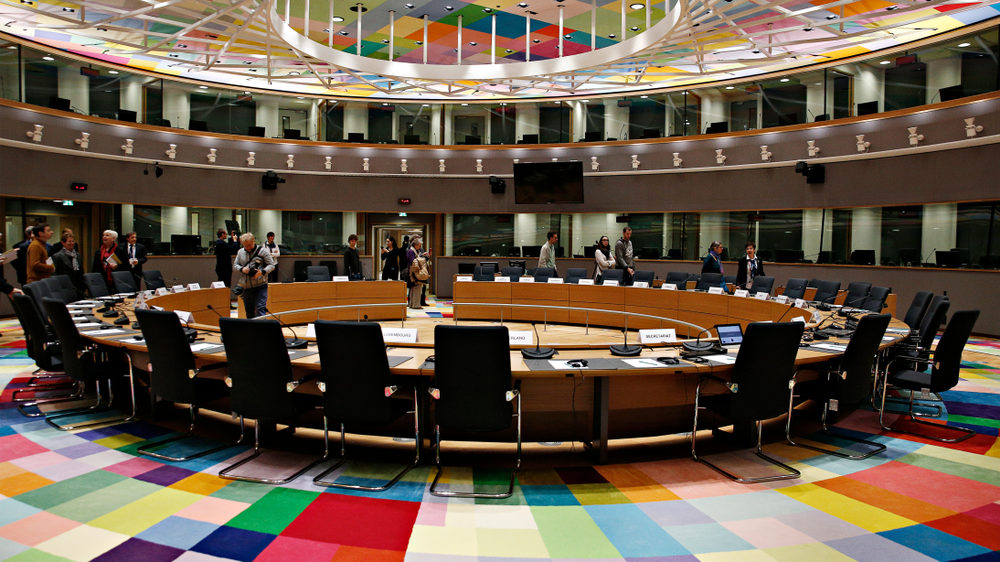
On its face, the request from the U.S. Department of State seemed simple: Design a digital dashboard to allow officials to quickly research how often United Nations (UN) member nations had sided with the U.S. on various topics. Wondering how often the votes of the U.S. and members of the G-77 have coincided on issues related to human rights? Nuclear arms and disarmament? Decolonization? Plug in the variables and find out.
In practice, it was anything but.
“From a policy perspective,” Associate Teaching Professor Fiona Creed says, “people often think there are a lot of possibilities, and there are. But then you add the data piece into it, and you realize—this may not be as straightforward as we think.”
It was the spring of 2020, and Creed had secured a project via the State Department’s Diplomacy Lab program, a public-private initiative wherein the federal agency partners with colleges and universities, outsourcing research and other tasks related to foreign policy challenges by offering student teams, led by faculty experts, the opportunity to wrestle with real-world problems.
For this particular project, the charge was to find a way to measure and visually render the degree to which members of the Group of 77 developing nations (a bloc that now numbers 134 and includes Cuba, Iran and Afghanistan) had voted in alignment with the U.S. Creed found the problem fascinating, and she knew her students in the College of Professional Studies’ Global Studies and International Relations graduate program would embrace the challenge.
She also knew they couldn’t do it alone.
The task was perfect for Creed’s students because it required researching, developing, and applying a sophisticated understanding of international relations to categorize UN resolutions and group them by topics and subtopics. But it also entailed logging the votes on each resolution, building digital dashboards, and figuring out the best ways to graphically render the decades of information contained in the UN voting history. Massive amounts of data were involved. The numbers would have to be crunched, the code written, and a design that would let users easily turn the figures into images such as bar graphs would have to be conceived and executed. All of it would take some serious expertise in programming and data analytics.
A long-awaited collaboration
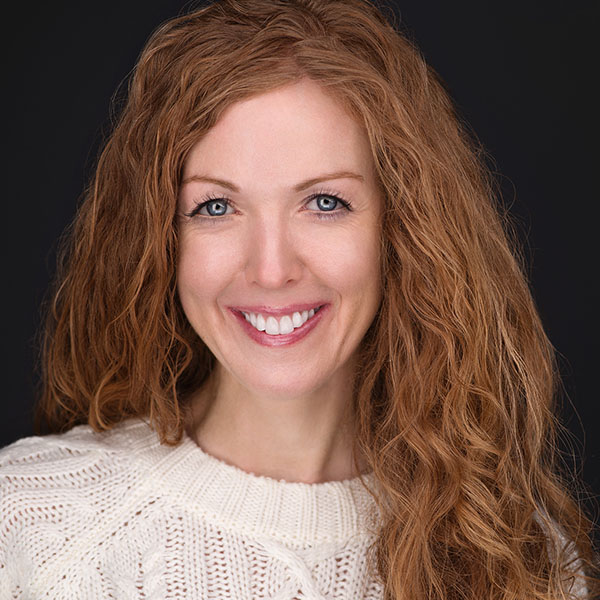
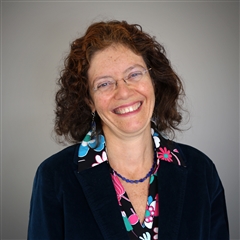
Luckily, Creed knew just whom to call—in fact, that person was sitting right across the hall.
“Alice is very good at explaining to me how the data works and what’s actually possible,” Creed says of her colleague and office neighbor Alice (pronounced ah-LEE-say) Mello, an assistant teaching professor in the Master of Professional Studies in Analytics program. The picture that emerges as the two describe working together is a kind of collaborative counterpoint, with Creed the visionary international affairs expert and Mello the technical miracle worker—and grounding voice of reason.
“I come in with big ideas,” Creed says. “‘This is amazing! We can definitely do this! Absolutely! Consider it done!’ And then Alice is right there saying ‘No, actually, that’s not going to work, because the data just won’t support it—but here’s what will work.’”
That synergy, rooted in shared experience and complementary expertise, has been years in the making.
Creed, whose career has encompassed research, diplomacy, entrepreneurship and the nonprofit sector, was born in Ireland and started her professional life as a policy analyst at the EU Delegation to the United Nations in New York City. She later served as executive director of the United Nations Association of Greater Boston, where she oversaw operations including Model UN, the Association’s flagship experiential learning program focused on diplomacy and global issues. For her PhD in European Studies at University College, Cork, Creed studied EU coordination at the UN.
Mello, born in Brazil, began her professional career as a programmer while still a student at the Federal University of Bahia in Salvador, Brazil. She went on to work as a software engineer for Coelba, the big utility that distributes power in Bahia state. She later developed database management applications for the Massachusetts Water Resource Authority, worked as a programmer at MIT and co-developed a technology-in-education consultancy. Her PhD from Tufts University is in Education, Technology, and Drama.
When the expatriates met at Northeastern, Mello says, they quickly found common ground, and before the Diplomacy Lab opportunity arose, they had long imagined working on a project together.
“I had a project with the UN in 2018,” Mello says, “and I approached Fiona about how we might make it sustainable, but we didn’t really end up pursuing it. Another time she asked me to present to students who needed data analytics on their projects. So we’ve had a few times that we’ve tried to work together, but nothing really went up. This time, it did.”
With students in their capstone classes and other courses onboard, the two educators launched the project. Soon, as global studies students sifted through thousands of UN resolutions, applying their knowledge of international affairs to categorize each, data analytics students began building the user dashboard and writing the code to generate a powerful, intuitive interface that would allow end-users to easily parse the information to suit their needs. As the students worked, their collaboration began to mirror that of their professors.
“One of the most interesting pieces for us was hearing the students interact,” Creed says. “The identification of the countries was becoming so fluent for the data analytics group that they were starting to notice things about the politics and to ask questions that the global studies students could answer. It was brilliant to see that come together.”
“For the analytics students it was super-interesting,” Mello adds, “because it’s basically getting qualitative data and transforming it into something quantitative. If it’s all quantitative, you punch in the numbers—and I’m not saying it’s easy—but you can do it. But to get qualitative data and then to transform that into quantitative, to look at patterns and have some basis for it statistically, that is where all the magic and the synergy came in.”
Inherent uncertainty
As students labored to build something new, part of the challenge became grappling with ambiguity. When you’re inventing something, it can be hard to know what success—or a good grade—will eventually look like. But learning to tolerate the uncertainty inherent in such a process, Creed and Mello say, actually helped students explore new modes of thinking.
“Working logically, analytically, but also understanding the process isn’t having all the answers, it’s figuring them out—I had never had that kind of thinking until I did my PhD,” Mello says. “But in this project, we tried to bring that to these students, because that’s the thinking that they need to do well to be good data scientists and good data analysts. It really resonated for me, to see them learning that way.”
Creed and Mello also note that, in some ways, the composition of the classes doing the work reflected the subject of the work itself.
“I had students from India, Ethiopia, a student based in Kuwait, and one in Qatar, who is in the U.S. military,” Creed says, “and then Alice’s group had students from China, India, and the U.S. When you’re looking at policy making and analyzing all of what was in front of us, it was really interesting to get the perspectives of students who were from the countries that they were working on and seeing patterns, or not seeing patterns, and then we could tease out afterwards with them, ‘What do you think of that?’ or ‘Why is that?’”
One of the most interesting developments, the researchers say, was the shift from a U.S. focus to a more global perspective. Engendered in conversation with their UN contacts, in the perspectives of students from diverse countries of origin, and through their own lenses as immigrants, that shift came to reflect the deepest mission of the portal that would eventually be known as the Global Consensus Toolkit.
“A primary motivation for having a public access portal,” Creed and Mello write in the introduction to the visual analytics platform they and their students developed, “is to level the policy-making playing field.”
“There was a lot of data,” Creed says. “We worked with it, Alice and I, plus multiple teams of students. There are many departments of foreign affairs or governments, globally, that just do not have the time or money to dedicate to getting into the UN digital library, downloading everything, coding it, reworking it—and so that’s where coming back to that original Diplomacy Lab ask, that we saw the relevance of this material being publicly available. And the usefulness of it.”
Big audience, broad applications
That usefulness, Creed and Mello say, reaches far beyond international affairs. Although the Toolkit was designed with diplomats in mind as the end-users, the information it contains—and the lenses it provides for sorting and analyzing that information—might easily be applied in the work of researchers, think tanks, nonprofits, advocacy groups and policy decision-makers or anyone else seeking to accurately chart the tides of power and the relationships among nations over the past 20 years.
From their “client,” the Global Consensus Toolkit earned rave reviews. When students presented at the State Department via Zoom, the reception was unequivocal. A senior UN official in attendance, Creed reports, was astonished.
“He said, ‘That is amazing. We have tried to work with this data before and we have never seen anything like that,’” Creed says. On the spot, he proposed a continued collaboration, one that would involve digging even deeper—and would not require a new application through the Diplomacy Lab program. With that project in mind, Mello and Creed plan to align their capstone classes this winter and next spring. For now, they are delighted to invite the world to use the free, online tool they and their students developed.
“Fiona told me in the beginning that nobody had done this work before,” Mello says. “There have been some static models of voting patterns, but we were able to create an interactive dashboard that is really functional—and that, nobody has done.”
A Pair of $7 Shoes Sparked Her Career Exposing the Real Cost of Fast Fashion
Journalist Elizabeth Cline, a sustainable fashion expert who’s long warned consumers about the high cost of fast fashion—the production of inexpensive, trendy clothes—enrolled at Northeastern when she decided that raising awareness isn’t enough.
The author, who’s in Northeastern’s global studies and international relations master’s program, has been on the forefront of the eco-conscious clothing movement since 2012 when she released her book “Overdressed: the shockingly high cost of fast fashion.”
Make a Bar Your Home Office

At many of London’s eateries, it’s not uncommon to see hungry patrons clamoring for a table during the 6 o’clock dinner rush. But during the day, the restaurants often sit idle, bereft of crowds. Seeing an opportunity within this lull in the day, Northeastern graduate Van Sharma hatched an idea.
What if these spaces didn’t need to sit empty for half the day? What if they could be repurposed for other uses during periods of downtime, he thought, to provide a workspace for the entrepreneurs and freelancers who call London home?
Four Countries. Four Students. One United Nations Summit to Promote Gender Equality.
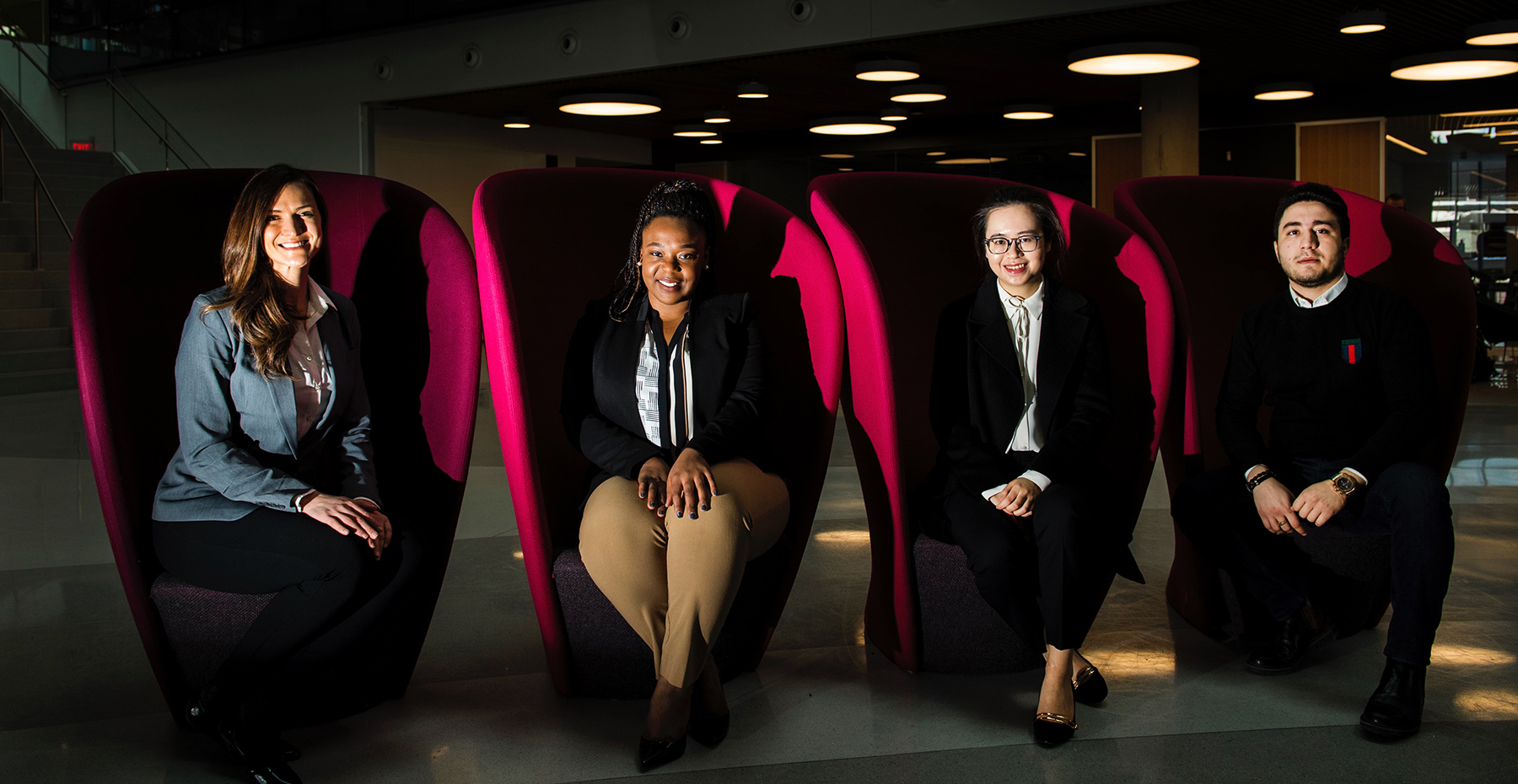
For four Northeastern students, volunteering at a United Nations commission is more than just a course assignment; it’s a chance to represent their countries on the world stage.
Barbara Alcena, Movlan Aliyev, Aislinn Mangan, and Juan Ning, graduate students in Dr. Tatjana Kobb’s public diplomacy class, are volunteering at the 63rd annual United Nations Commission on the Status of Women at U.N. headquarters in New York City through March 22.
The U.N. Commission, founded in 1946, is the principal global diplomatic body exclusively dedicated to the promotion of gender equality and the empowerment of women. Representatives from U.N. member states and certain nonprofit organizations gather each year to assess global issues that affect gender equality in order to come up with specific plans to address those issues, country by country.
Fostering Global Agility and Intercultural Connections
More than one million international students are studying in the United States this year, the largest number ever and an 85-percent increase over the past decade, according to Marissa Lombardi, EdD. Helping to ensure that they, and U.S. students studying abroad, get the most from international experiences is Marissa’s goal.

An assistant teaching professor and the faculty lead for the Global Student Mobility concentration in the Master of Science in Global Studies and International Relations program, Marissa specializes in international exchange and intercultural competence. She is the coauthor of the book In Their Own Voice: Intercultural Meaning in Everyday Stories.
“International students contribute a huge part of our economy and give us opportunities to internationalize our campuses,” she says, adding that there is a need for university-based professionals to support these students and their academic success.
In 2015, Marissa was selected to join Northeastern’s Center for the Advancement of Teaching and Learning through Research (CATLR) as a faculty scholar. With a staff that brings a wealth of experience in research methods and assessment, the center supports faculty research that informs teaching. Invited to stay on for a second year as a lead scholar, Marissa is now preparing to publish her findings while supporting other scholars in the program.
As part of CATLR, Marissa has explored international students’ experiences in online learning environments and how universities can better support them. In interviews with 42 students at Northeastern, she found that international students taking online classes have different needs and expectations than domestic students. Although many reported that online courses were beneficial to their writing skills, they are seeking a sense of community and to develop a professional and social network, as well as honing their verbal and nonverbal language abilities, which includes peer-to-peer engagement.
Offering co-curricular structured and informal opportunities to meet face-to-face can go a long way, she says. “Students are asking for this.”
Marissa’s work at CATLR will inform her, and other faculty members’, teaching across the university, which welcomes a significant number of international students and ranks 6th among leading U.S. institutions with the most international students, according to the Institute of International Education.
Marissa joined Northeastern in 2014 after spending eight years in Italy, where she served as dean of students at Lorenzo de’Medici Italian International Institute in Florence, Italy. Many of the students in her Global Mobility concentration have come to Northeastern from all over the United States and the world, seeking to enter or advance in the field of international higher education—for example running study-abroad offices or English for Speakers of Other Languages (ESOL) programs—or to work for governments or nongovernmental organizations. Last year, her “Global Literacy, Culture, and Community” course had eight countries represented, including China, Mexico, Peru, and Sierra Leone. Students also take “Managing Study Abroad,” “Managing International Students,” “International Higher Education,” “The Business of International Higher Education,” and a capstone class that can include an international field-study experience.
Marissa designed the innovative international field-study experience course. The class meets for eight weeks online and then comes together for one intense week in Italy, where students meet with a different company every day. Working in teams, they do a consulting project that addresses a problem facing industry; in 2015 and 2016, the theme was sustainability. Students developed a 2025 sustainability plan for La Marzocco, a high-end espresso-machine maker, based on interviews with surveys of leadership and staff across the world. The company is now implementing the plan and acknowledges the students’ work on its website.
“This is synergy between industry and academia at its finest,” Marissa says, adding, “The course is closely aligned with our university priorities: it gives students a global experience, is flexible and interdisciplinary, and offers them the chance to work together and in an international location.”
Marissa worked in Rome after her undergraduate studies, for an international bank that had both Italian- and Arabic-speaking staff. She found herself designing an ESOL curriculum as the bank moved toward using English in business transactions. That work led to intercultural training for bank executives who traveled all over the world.
“Many bankers were finding that deals fell apart because they didn’t have basic international competence about the regions they visited,” she says.
Measuring Intercultural Competency
As part of her research at Northeastern, which “promotes global citizenship and cultural agility,” Marissa says, she has used assessment tools to measure students’ intercultural development and competency. Among her top findings: students get the most out of global experiences when they have faculty guidance and when there are opportunities for active reflection on their experiences. “That means developing competencies such as empathy for other people, adaptability, curiosity, and open-mindedness to other customs,” she says. In addition, in short-term faculty-led programs, students who had previous intercultural exposure, even through friendships, experienced more intercultural development when they went abroad than those who hadn’t had that previous exposure.
Marissa’s research at CATLR has helped her better understand the experiences and needs of international students enrolled in online classes. She hopes her findings will be helpful to academic institutions that deliver parts of the curriculum to international students in online formats. In June 2017, she will present her research at the University of Professional and Continuing Education Association’s Summit for Online Leadership.
“The Center for Advancement of Teaching and Learning through Research has provided incredible support and a wonderful community of scholars around the university to help me in my work,” she says.
2016 Co-op Awards Ceremony
Excellence at Work
A Year of “Firsts” for Annual Co-op Awards; Eight Students Receive Awards
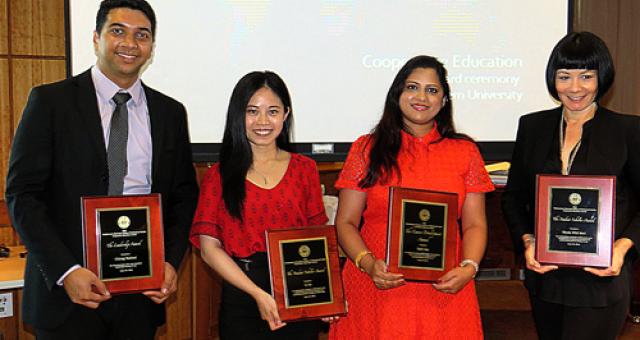
Each academic year, approximately 500 Northeastern students take part in work placements related to their field of study through the College of Professional Studies (CPS) Experiential Learning program. At the end of each year, the College honors select students at the annual Co-op Awards ceremony, based on nominations from employers.
The 2015/2016 Co-op Awards, which honored eight students, saw a series of firsts: the first award winner from the Experiential Network program; and the first recipient from the University’s Charlotte campus.
Zubi Aziz (Master of Science, Regulatory Affairs for Drugs, Biologics, and Medical Devices) received a Career Development award for her co-op at Baxalta, a start-up biopharmaceutical company. Zubi was known as the “go-to resource” in the department, according to Patricia Carolini, the head of safety analytics at Baxalta, who described Zubi as someone with exceptional integrity, character, and professionalism. They were so impressed, in fact, that Zubi has been offered a full-time position at the company.
Shuli Ciu (Master of Science, Regulatory Affairs for Drugs, Biologics, and Medical Devices) also received a Career Development award after completing two co-ops at Cerulian Pharma, Inc., first in regulatory affairs and then in clinical operations. Tiffany Crowell, vice president of clinical operations, saw Shuli “grow from an observing student to become an active participant in clinical trials, working well in cross-functional teams.”
Pamela Darcy-Demski, (Master of Science, Corporate and Organizational Communication) received the new Experiential Network Award, designed to recognize students involved in short-term projects offered through a corporate sponsor. Pamela conducted a feasibility analysis on Massachusetts State Police Academy’s use of technology in training cadets, helping it transition to a more user-friendly cloud technology. Melinda Lovick, the e-learning coordinator for the academy, spoke of Pamela’s capacity to “exercise professionalism and poise and routinely go above and beyond.”
Jennifer Krajewski (Master of Science, Regulatory Affairs for Drugs, Biologics, and Medical Devices) was awarded the Integrative Experiential Learning Award for students who participate in a co-op in their own place of employment. In Jennifer’s case, this was TreeHouse Foods, where she led a cross-departmental initiative to update labels based on the release of the State of Vermont’s Genetically Modified Food Labeling Regulation—all outside of her normal duties at the company. Her new role increased her contact with staff from other departments. “This program set me up for some of the best learning experiences I have had at Northeastern so far,” said Jennifer in her acceptance speech.
Kyle Moore (Master of Arts, Homeland Security) was one of two recipients of a Leadership Award for his work with the National Guard Homeland Security Institute. Captain Christopher Johnson, deputy director of the Institute, praised Kyle’s hard work on a small team of four staff members leading national and state-level initiatives. “People are better protected and better able to respond to disasters than they were before, thanks to work that Kyle did,” said Captain Johnson.
Nicole Wilde Merl, (Master of Science, Corporate and Organizational Communication), a student at Northeastern’s Charlotte campus, was awarded the Student Scholar Award for initiating a virtual co-op with Washington, D.C.-based public relations agency, Thomas Cooke and Associates. Nicole described her internship as a “true two-way internship” with faculty and Thomas Cooke equally invested in the project, which created a social platform to empower women to vote in 2016 and beyond through a project called WomenVotes.org.
Chirag Rathod (Master of Science, Project Management) was a recipient of the Leadership Award. Joe Flynn, Northeastern alumnus and director of inside sales for Akamai Technologies, credited Chirag for helping his company secure a $1 million deal, its biggest that year, and praised Chirag for leading by example, seeing the big picture, and coming up with creative solutions to challenges. “I never felt like an intern,” Chirag said in his acceptance speech. “I was always encouraged to participate in every team meeting and was given an opportunity to innovate and challenge the traditional way of working without having that fear of failure.” Chirag has since been offered the opportunity to stay on with the team full-time.
Qi Qin (Master of Science, Global Studies and International Relations) was awarded the Student Scholar Award for her work with Quincy Asian Resources. As an outreach specialist, Qi hired, trained, and supervised a team of eight bilingual undergraduate students and volunteers, and, in the words of Executive Director John Brothers, “the department‘s performance improved remarkably under her leadership.” She has now transitioned into the role on a permanent basis.
Ebola-Fighting Doctor Gives Account of Outbreak in Liberia
Dr. Steven Hatch is no stranger to international medical crises. He has cared for patients in Haiti, Venezuela, Colombia, and Mozambique—and in Liberia, where he worked in an Ebola Treatment Unit in Bong County and trained local medical staff at the John F. Kennedy (JFK) Hospital in Monrovia. Recently, Dr. Hatch shared his experiences with a rapt audience of students, faculty, and staff at a forum organized by the Global Studies and International Relations master’s program.
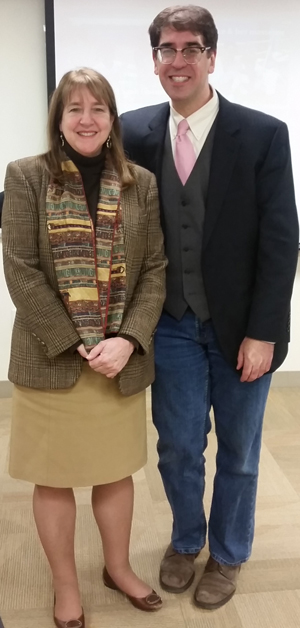
Dr. Hatch began his talk by urging the audience to stop thinking of Ebola in the popular “sci-fi horror terms.” While acknowledging that Ebola is a terrible disease, for Dr Hatch the real horrors lie elsewhere.
“The real tragedy was a tragedy of infrastructure,” he said. “We saw thousands die not because of the immunology or mutations of the virus, but because of a lack of running water and of facilities that don’t allow, in rural Africa, places for clean hygiene or disease surveillance.”
On the first of several visits to Liberia, Dr. Hatch worked with the country’s leading expert on the disease, Dr. Abraham Borbor, to train medical residents. When Dr. Borbor died of the disease in August 2014, Dr. Hatch felt compelled to return to Liberia to continue the work of his friend and colleague, volunteering in the fall of 2014, at the height of the epidemic, with the International Medical Corps in an Ebola Treatment Unit. At that time, thousands of people were presenting at medical centers across the country with the disease.
“I don’t mean to be melodramatic,” Dr. Hatch said. “But I thought I was on a one-way ticket.”
Dr. Hatch described how Ebola spread rapidly in this first outbreak of its kind to reach urban areas. He outlined the role of the civil wars in Liberia and Sierra Leone in destroying the public health infrastructure, and said that nobody could have predicted an outbreak of such magnitude. He described the extraordinary lengths medical staff went to in order to protect themselves; offered case studies of patients who survived, and others who did not; and emphasized the importance of field work in understanding how problems manifest themselves.
“In Liberia I heard suggestions from Americans that were completely bonkers,” he said. “But they didn’t realize they were bonkers because they weren’t there.”
In addition to presenting the science and epidemiology of Ebola, Dr. Hatch also discussed how the Ebola story played out in the United States, including the panic engendered by some media outlets.
“It’s just a virus,” he said. “Yes, it’s a deadly virus, but it’s just a virus that doesn’t spread very much. The double cheeseburger is a much more lethal threat in the United States than Ebola will ever be.”
Students and professors alike were riveted throughout the two-hour talk and asked questions about how a future epidemic can be prevented; the impact that Ebola has had on cultural practices; the stigma attached to former patients; the role of survivors in taking care of patients; and the role of communications in supporting the response to the epidemic.
“Students and faculty were impressed by the unassailable authority of Dr. Hatch’s first-hand experience,” said Mary Thompson-Jones, director of the program. “He took the topic of global health and told us all why it matters. His talk is a dramatic example of our efforts to link students to real-world practitioners – in the classroom, through our faculty, as well as through our occasional speaker series.”
Faculty Member Helps Lead Northeastern’s Very Own “Digital Humanitarians”
When the Ebola crisis reached alarming levels in West Africa late last year, help was to come from an unexpected source: faculty and students from Northeastern.
This was in part thanks to Joseph Guay, a digital humanitarian and faculty member in the Master’s in Global Studies and International Relations and the Geographic Information Technology (GIT) program.
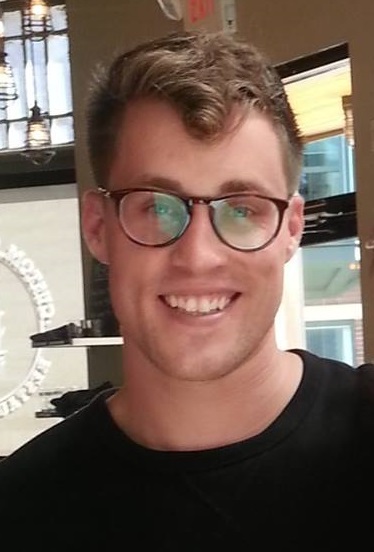
Guay was already involved with The Standby TaskForce (SBTF), a group of volunteer crisis mappers who collect important open-source data to help the United Nations (UN) and humanitarian agencies improve their responses. What better way for his Crisis Mapping for Humanitarian Action students to understand the real-life impact of the classroom skills he was teaching, Joe thought, than to involve them in helping respond to the world’s worst outbreak of the Ebola virus?
Joe and co-instructor Steve Purcell believe in a holistic approach to crisis mapping, an emerging cross-disciplinary field where public health specialists, technology entrepreneurs, Geographic Information Systems (GIS) experts, field clinicians, and social scientists get together in virtual and physical spaces to make sense of needs in natural disasters, or warn vulnerable communities in conflict settings, for example.
Before setting out on the SBTF deployment, his students, most of whom are pursuing GIS and Homeland Security degrees, were encouraged to become familiar with humanitarian principles, explore the relationships between conflict and climate-induced crises, and gain a perspective on the democratization of information communication technologies (ICTs).
Before training modules on remote sensing, SMS aggregation tools, or mobile surveys, students were trained to think about how a digital response depends greatly on the resources available on the ground, about the global shifts that make digital volunteerism possible, or about the ethical implications of data mining.
By the time he’d asked students to send text messages about traffic conditions in their local commute (a lesson on Frontline SMS and Ushahidi heat maps) they were already thinking about ways such re-envisioned technologies can create valuable data in low resource settings.
In the Ebola exercise, students worked at the other end of the spectrum, using crowd-sourced methods and open-sourced data alongside hundreds of others to gather and share information on the availability of Ebola Treatment Units in Sierra Leone, Liberia, and Guinea, a resource that was to be made available on the Humanitarian Data Exchange, a web repository for data that was set up by the UN Office for the Coordination of Humanitarian Affairs (OCHA). The students gained extra credit-and valuable real-world experience at the same time.
Joe is unstinting in his quest to bring home to his students the importance and potential of this new field for humanitarian response. To that end he has brought some outstanding guest lecturers to the classroom, including Patrick Meier, named 2014 National Geographic explorer of the year (the first digital explorer to gain such recognition); Laura Walker Hudson from Social iLab, the creators of the Frontline SMS tool, and Andrej Verity from OCHA, a driving force behind the Digital Humanitarian Network (DHN) and the Humanitarian Data Exchange.
In May, Joe may be teaching this online course from Beirut, where he’s set to be consulting for the aid organization World Vision, leveraging digital technologies to investigate possible tensions between refugees and host communities in Lebanon and Jordan. Upon his return, he will travel to Washington D.C. to give a training and presentation on crisis mapping at an upcoming United States Geospatial Intelligence Foundation, GeoInt2015, along with Cordula Robinson, director and faculty member of the GIT program.
“I’m not actually a crisis mapper, but a social scientist,” says Joe. “And that’s crucial for this area of work. It’s important to give the students skill sets, but first we need to orient students so they have an understanding of the roles of different humanitarian actors in an emergency. Understanding what they’re doing, what they’re contributing to, and not just how to do it, is a powerful thing.”
Read Joe’s blog post “How Digital Humanitarians are Improving the Ebola Response.”
And the co-authored blog, “Climate change induced displacement: leveraging transnational advocacy networks (TANs) to address operational gaps.”